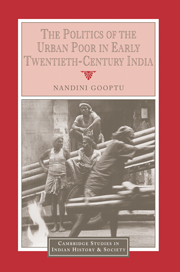Book contents
- Frontmatter
- Dedication
- Contents
- List of tables
- Acknowledgements
- List of abbreviations
- Select of glossary
- 1 The study and its perspectives
- Part I Changing contitions and experiences in interwar north India
- Part II Modes of political action and perception
- 5 Untouchable assertion
- 6 Militant Hinduism
- 7 Resurgent Islam
- 8 Nationalist action
- 9 Congress socialist mobilisation
- 10 The politics of exculsion and the ‘virtuous deprived’
- Bibliography
- Index
5 - Untouchable assertion
from Part II - Modes of political action and perception
Published online by Cambridge University Press: 05 July 2014
- Frontmatter
- Dedication
- Contents
- List of tables
- Acknowledgements
- List of abbreviations
- Select of glossary
- 1 The study and its perspectives
- Part I Changing contitions and experiences in interwar north India
- Part II Modes of political action and perception
- 5 Untouchable assertion
- 6 Militant Hinduism
- 7 Resurgent Islam
- 8 Nationalist action
- 9 Congress socialist mobilisation
- 10 The politics of exculsion and the ‘virtuous deprived’
- Bibliography
- Index
Summary
Urban transformation in the early twentieth century profoundly affected the social and political experience of the poor, and shaped the ways in which they came to understand the world and their place in it. At the heart of this process was their quest for new identities and the search for new cognitive frameworks to conceptualise the nature of change. These ontological endeavours to imagine the self and its relation to the world and others in rapidly evolving settings provided the central dynamic behind the construction and reformulation of religious, class, caste and nationalist ideologies among the poor. The forging of new identities and political vocabularies constituted the responses of the poor to changing relations of power, inequality and domination, and encapsulated variously their resistance to, negotiation with or contestation of power. By constructing new forms of identity, the poor redefined their subjectivity as political actors and reconceptualised their own capabilities and potentials as human agents. This defined the nature of their political endeavours and collective action, aimed to interrogate extant norms of hierarchy and power. With this analytical perspective, and against a backdrop of the extensive social transformation of the early twentieth century, discussed in the first part of this book, the second part now turns to the changing political identity and action of diverse groups of the poor.
- Type
- Chapter
- Information
- The Politics of the Urban Poor in Early Twentieth-Century India , pp. 143 - 184Publisher: Cambridge University PressPrint publication year: 2001

